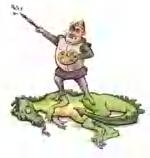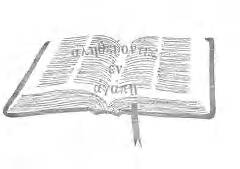A Look at the book: A Man and Two Trees:
The Father's House! "That God may be all in all" [1st Cor. 15:28]. When first century believers were placed into Christ, these set the stage for the Father to dwell "in all." The Eternal Son was associated with the Father's Will, before the age-times arrived and sin entered into the world, after the creation. What a statement! We have to read it several times before all of the ramifications settle in on us. Read it again.
The first intention and design was for the Father to live in His children, the objects of His great love principle. Then, sin entered into the picture and redemption became a work until it closed with the message, "Be ye reconciled to God." The word, "reconcile" means to be friendly again. It means to get beyond the problem and return to the first relationship.
Beyond all the different ages, recorded in scripture, the "good pleasure of His will" was there to powerfully produce the Father's love-intention for all ages after that. The next question is "When was this "pleasure" of God accomplished and completed?"
"That in the dispensation of the fullness of times He might gather together in one all things in Christ, both which are in heaven, and which are on earth; even in Him."
The time frame, of which Paul speaks ("the dispensation of the fullness of times"), was during the first century when God became flesh and dwelt among men. He dispensed (or revealed) Himself in the person of Jesus Christ. It must have pleased God greatly, to wrap Himself in a robe of flesh and live in humanity. For, this was a big part of the first intention of heaven.
The "fullness of times" speaks of the time when all other past ages or times poured into the last age. It filled it full of the redemption purpose and prophecies of past ages that were recorded in the "Old Testament." We are now living beyond those "last days." We are now living in the "ages to come" when we can observe "the exceeding riches of His grace." In other words, we are living in the dispensation of a God-centered program of a Father's grace and love for His household.
First century believers understood about the "all things" that the Father had dispensed to His children in past ages. Those "New Testament" days were labeled "the dispensation of the fullness of times." For, it was the time when the Father gathered into Christ Jesus, everything on earth and in heaven. It was the time of a completed redemption. The Father's ultimate or first love-intention was brought to light in His "beloved Son."
Before the creation of the heavens and earth, the Father intended that His Son would express the Father's first love-desire to the creation. This was to be an ongoing LOVE in the heavens and earth. This was the first step. For God was to then indwell His children on earth and in heaven.
THERE WAS NO INTENTION HIGHER THAN THE FATHER'S FIRST LOVE!
This Divine intention was "according to the good pleasure of His Will." Deserving or undeserving was not in the "mix." This was simply governed by and according to the Father's pleasure, not the children's worthiness. Another important fact was that men could not forfeit it by misconduct. This "first love" was "according to the good pleasure of His Will."
Up to this point, one will see the Father's will or ultimate intention springing out of His paternal nature and desire alone. Before the foundation of the world, the Father marked out for Himself a vast family in whom He would share His life, nature, spirit, vision, purpose and dedication. All of this was to be accomplished through His Son. The Father never intended for the program of redemption to overshadow the original purpose of the Father loving and living in His children.
The invasion of "death" was an interruption to the Father's first intention. This spiritual death was "separation from God." What place does the redemption story have in all this? It is the recovery program that brings His first purpose back on course. As beautiful as the redemption story is, it dims in comparison to the brightness of the Father's first love.
If we look far enough back, we see a very different Christ entering the picture and fulfilling the Divine Desire. Most see the Christ only as Messiah, fulfilling prophecy. It takes new bifocals to see the purpose of God indwelling Christ, fulfilling the first design.
"For in Him dwelleth all the fullness of the Godhead bodily."
When we understand the first design, we see why God indwelt the first century saints (ekklesia). At that time, God was in Christ, dwelling in the first century believers. This insured them of the hope they had in the soon approaching Parousia or presence of God when God would be "all in all." It was only then that the purpose of the indwelling Christ was seen to be the stepping stone for God to be present "in all" His children.
".the church, which is His body, the fullness of Him that filleth all in all."
As the loving Father takes residence in His children, we clearly see the reason for missions, evangelism, preaching and teaching. The theology is now crystal clear. The Father's greatest pleasure is the love for His family and desire to live in them. If a wise and loving father could live his life through his children, they might not do so many unproductive things to themselves and others. This is the divine philosophy that the Christ brought to the world from God.
If we stop looking at God's big plan as something for man's needs to be met, our viewpoint of the Father's first intention will take on new meaning and we will see it give the Father honor, glory, pleasure, and satisfaction. The real secret of blessedness is having the correct center in one's life.
The prompting of unbridled senses in a man-centered life fade in view of the God-centered life. A God-responsive minister will see the circumference of his ministry mirror bridled senses and obedience to a loving Father Who is the inner center. Then and only then will the externals of life matter less? Life's selfish purpose and goals will end and what matters to the Father will be the underlying thrust. Each "now" in service will become a blissful, eternal moment. Earth and heaven become one when the life is God-centered.
There is something very special to me and that I enjoy. I love to play the keyboard and sing old songs and hymns. If, while I am playing, someone is drawn in to watch my fingers move over the keyboard, would that satisfy my first intention? My intentions were never to perform songs so that people could watch my fingers striking each key of the instrument? I have a scar on one of my fingers that was caused by falling into a pile of broken glass. My fingers are stubby and because of building so many outside projects, my fingernails are not easy to look at. My reason for performing with these hands would certainly not be to display them. My first intention would be for others to enjoy along with me the major and minor melodies, progressions with augmented and diminished chords, harmony and inspiring words. Sometimes, I would end a song with a 9th or 13th chord and in that same moment, look into the listener's face to see their reaction to that strange and new sound. My intention has been for others to be blessed by the arrangements, sounds and message of the song. I would want it to appeal to their hearts. My main intention exemplifies the Heavenly Father's first intention. He would not want His children to be concerned so much with how He was doing things as to the grand conclusion of His actions. He wants His children to love Him and feel safe in His presence. He wants them to place their total trust in Him as a loving Father, and enjoy Him in their lives.
This was always in the heart of the Father, before His Spirit indwelt the Son of God, Who would be the agent of the Father to indwell the first century Body of believers.
So, you see, Adam could have met the Christ face to face. Therefore, without the "hazard factor," there would have been no physical death and without the "sin factor" there would have been no sentence of spiritual "death" for Adam and Eve and their descendants. Eating of "the tree of life" or entering into spiritual life would have taken Adam into the mature (perfect) spiritual realm. Each individual after Adam could have realized their physical potential and transmigrated by their own personal spiritual life, smoothly into the joys that awaited them in their full maturity when God would dwell in them, not with them as He first did in the Garden.
Maturity or perfection has the ability to know the difference between "good" and "evil." Infants don't have this wisdom. For it is only found in "maturity." The tree of "the knowledge of good and evil" was there to partake of. However, Adam and Eve must grow in their obedience to God and then He would give them wisdom in their development and maturity as they walked in fellowship with God each day. God had warned them to not take the "short cut" and claim for themselves the knowledge and wisdom of maturity until they had become ready for it. However, they reached out for that which was forbidden at that time. They disobeyed as immature children, not caring about the consequence of choosing the time to be mature and make mature decisions for life and fellowship with God.
What more can we say about what might have been for Adam and Eve? We will never completely understand until our eyes are opened by His loving touch. However, we may learn what man should become as we look into the pages of scripture, at the perfect Son of God.
Scriptures mentioned above:
Colossians 3:11; 1st Corinthians 15:28; Ephesians 1:10; John 1:14; Romans 1:3; 8:3; 2nd Corinthians 5:16; 1st Timothy 3:16; Hebrews 2:14; 5:7;
From Adam to Noah; from Abraham to Moses; from the Prophets to John the Baptist.; The "New Testament" time, the first century.
Hebrews 1:2; 2nd Corinthians 5:16; Colossians 2:9; Ephesians 2:22,23; Genesis 3:22 - "And the Lord God said, Behold, the man is become as one of us, to know good and evil, and now, lest he put forth his hand, and take also of the tree of life, and eat, and live forever." After maturity (tree of knowledge of good and evil) comes resurrection (tree of life).
























